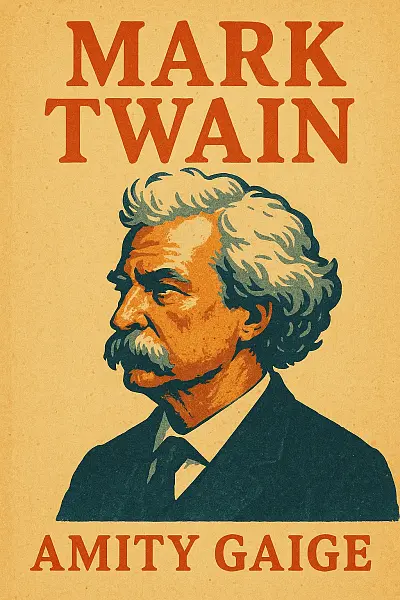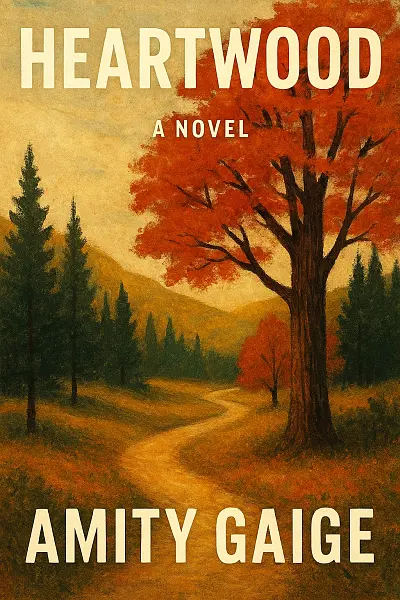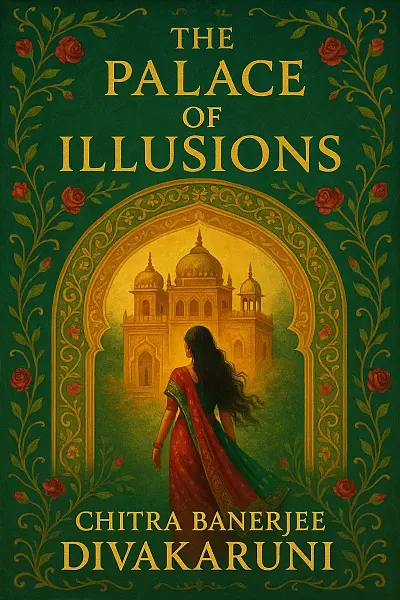
Mark Twain
by: Amity Gaige
Mark Twain, born Samuel Clemens, thrives in the colorful chaos of 19th-century America, driven by an insatiable need for storytelling and a restless hunger for fame. Settling into a promising literary career, he finds national attention for his witty journalism—until the pressures of celebrity life and repeated financial disasters push him into ever bolder pursuits.
Now Twain must juggle the cost of his ambition with the weight of personal tragedies and America's shifting identity. Every triumph spotlights his flaws, and his fearless commentary risks both fortune and family.
Will Twain’s uncompromising vision secure his legacy, or will it consume him first?
"Sometimes we borrow the voice of a legend only to discover the truth in our own silence."
Let's Break This Down
The Author's Voice
Atmosphere
Expect a thoughtful, gently immersive backdrop that often blurs the line between past and present. The mood is reflective, tinged with both warmth and melancholy—like a quiet, sunlit room where memory lingers in every shadow. Gaige draws readers into an intimate, almost meditative space, where the air feels heavy with history and longing.
Prose Style
Gaige’s sentences are smoothly sculpted, elegant without feeling fussy. There’s a lyrical undercurrent that never tips into overwriting; metaphors are fresh, yet grounded, capturing the emotional complexity of her characters with real finesse. Dialogue feels honest and sometimes slyly humorous, while the narration balances introspection and outward observation with ease. If you love prose that sings but doesn’t show off, you’ll feel right at home here.
Pacing
Mark Twain unfolds with deliberate care rather than breakneck speed. Gaige is in no rush, and she trusts her readers to settle into the story’s gentle ebb and flow. There are moments of quiet revelation and slow-burning tension, but don’t expect action-packed chapters—this is a book best savored, not devoured. The pace leaves space for rumination, drawing out subtle emotions and inner shifts.
Character Development
Characters are painted in nuanced strokes, their inner worlds crackling with authenticity. Gaige invites you deep into her protagonist’s psyche, layering vulnerability, self-doubt, and flashes of wit. Side characters have depth, too, often surprising you just when you think you have them figured out. There’s a real sense that everyone is carrying invisible histories, adding resonance to even the smallest exchanges.
Themes
Identity, legacy, and the friction between truth and self-mythologizing pulse through the narrative. Gaige explores how stories—those we inherit and those we invent—shape who we become. There’s a deep interrogation of authenticity, both personal and cultural, but it’s handled with a light, often wry touch that never feels heavy-handed.
Overall Feel
Reading Mark Twain by Amity Gaige is like leafing through a box of old photographs—achingly nostalgic, contemplative, and quietly luminous. If you want a novel that prioritizes depth over dazzle and rewards patient exploration, this one’s sure to resonate.
Key Moments
- Whimsical banter with Twain’s sly alter-ego—meta-fiction at its sharpest
- Epistolary chapters that blur the line between author and character—prepare to double-check reality
- A fever-dream river journey that unspools family secrets and American myths in equal measure
- Tongue-in-cheek satire bites at celebrity culture—Twain as both legend and literary ghost
- Father-daughter repartee that’s by turns hilarious and quietly heartbreaking
- Page-turning confessions set against a lush, timeless New England backdrop
- The final scene: Twain’s lost manuscript, laughter echoing in the silence—a perfect gut punch
Plot Summary
Mark Twain by Amity Gaige follows the fictionalized life journey of Samuel Clemens, better known as Mark Twain, played out against the backdrops of pre– and post–Civil War America. The novel opens with young Sam’s childhood along the Mississippi River, where his adventurous spirit and acute observation of injustice are forged. As he grows, Sam’s experiences as a printer’s apprentice, riverboat pilot, and later, gold prospector and journalist, shape his sardonic perspective and fuel his literary ambitions. The story climaxes as Twain, now an established author, grapples with fame, devastating family losses, and public scrutiny, culminating in his celebrated but bittersweet final years. The resolution offers a nuanced examination of Twain’s legacy—his humor, social criticism, and personal contradictions revealed in full.
Character Analysis
Sam Clemens/Mark Twain is portrayed as witty, restless, and deeply conflicted, struggling to reconcile his moral convictions with the privileges and contradictions of his era. Throughout the novel, he evolves from a mischievous dreamer to a world-renowned satirist, increasingly haunted by personal tragedies and the limitations of his own ideals. Key supporting characters—like Livy, his steadfast wife, and friends such as William Dean Howells—anchor Twain emotionally, challenging him while providing solace. Each undergoes subtle transformation as they navigate Twain’s changing fortunes and the harsh realities underlying his fame.
Major Themes
A standout theme is the tension between truth and fiction—Twain continuously blurs this line, both in his writing and personal identity, highlighting the transformative power of storytelling. The book also digs into race and class dynamics in 19th-century America, using Twain’s observations and relationships to expose hypocrisy and injustice (for example, his reactions to slavery and the Reconstruction South). Another major thread is fame’s double-edged sword, as Twain enjoys celebrity but also suffers from its isolating effects and vulnerability to public opinion. Gaige ultimately explores resilience: how Twain copes with loss, reinvents himself, and uses humor as defiance.
Literary Techniques & Style
Gaige’s prose is richly textured yet accessible, blending sly humor with flashes of lyricism that evoke Twain’s own voice. The narrative structure shifts between first-person reminiscence and third-person vignettes, mirroring Twain’s fragmented self-image and the recursive nature of memory. Symbolism is woven throughout—most notably, the Mississippi River recurs as a metaphor for freedom, change, and the unpredictability of life. The book leans on irony, allusion, and metafiction, often echoing Twain’s signature style while engaging readers in deeper questions about authorship and authenticity.
Historical/Cultural Context
Set against the tumultuous backdrop of 19th-century America, the novel vividly evokes settings from antebellum Missouri to Gilded Age New England. Social and political upheaval—slavery, the Civil War, industrialization—directly impact the characters, shaping their choices and worldviews. Twain’s literary ascent parallels real-world transformations in publishing, mass media, and American identity, making the backdrop as integral to the story as any character.
Critical Significance & Impact
Mark Twain has been praised for its vibrant reimagining of an iconic American life, deftly balancing entertainment with critical insight into Twain’s complexities. Its reception celebrates both Gaige’s homage to Twain and her willingness to interrogate myths surrounding American genius. The novel’s thoughtful blending of fact and fiction, along with its exploration of timeless questions about identity, storytelling, and social progress, ensure its relevance for modern readers seeking to understand both history and its storytellers.

America’s contradictions revealed through the wit and wounds of Mark Twain
What Readers Are Saying
Right for You If
If you love character-driven stories with a quirky, thoughtful twist, Mark Twain by Amity Gaige is probably right up your alley. This book shines for readers who enjoy:
- Literary fiction that isn’t afraid to dig into life’s big questions
- Stories that blend humor and melancholy in a really human way
- Deep dives into character psychology—if you like witnessing a character’s transformation (and maybe some messy decision-making along the way), this will totally hit the spot
- Introspective themes like family, regret, or the chaos of growing up (no matter your age)
- A bit of wit and playfulness in the writing—think smart observations, not slapstick
If you’re a fan of books by authors like Elizabeth Strout, Ann Patchett, or even classic Twain, you’ll probably find something to love here.
On the flip side, if you’re all about fast-paced plot twists or want a straightforward, action-packed story, you might find this one a little slow or meandering. Likewise, if you prefer your novels super-plotty with clear heroes and villains, this might not be your best match—it’s more about gray areas, inner conflict, and the beauty (and chaos) of just being human.
Honestly, if you’re looking for something literary, nuanced, and sometimes a little bittersweet, give this a try. If you want pure escapism or a wild ride from page one, you might want to skip it this time!
What You're Getting Into
Ever wondered what secrets might lurk in the life of an American legend?
Mark Twain by Amity Gaige sweeps you into the world of a witty, restless biographer who becomes obsessed with reimagining Twain’s life, blurring the line between fact and fiction. Balancing dark humor with heartfelt insight, this novel explores ambition, identity, and the price of storytelling—all with an irresistible, slyly clever vibe that'll keep you turning the pages.
Characters You'll Meet
-
Mark Twain (Samuel Clemens): Central figure whose witty, restless spirit and sharp observations on American life anchor the narrative. His journey explores the blurred lines between persona and authenticity.
-
Olivia “Livy” Clemens: Twain’s steadfast wife, who serves as his emotional anchor and moral compass. Her patience and intelligence often temper Twain’s impulsiveness and self-doubt.
-
Susy Clemens: Twain’s beloved eldest daughter, whose perceptiveness and admiration deeply affect his sense of self. Her coming-of-age offers both inspiration and heartbreak for Twain.
-
Charles Webster: Twain’s business manager and confidant, pivotal in both Twain’s professional triumphs and financial mishaps. His ambitious nature sometimes clashes with Twain’s ideals.
-
Henry Clemens: Twain’s younger brother, representing innocence and lost potential. His tragic fate becomes a defining thread in Twain’s emotional life.
More Like This
If Mark Twain by Amity Gaige drew you in with its biting wit and layered exploration of personal reinvention, you’ll find kindred energy in The Goldfinch by Donna Tartt. Both novels ride the line between profound self-discovery and razor-sharp social observation, blending dark humor with sincere longing. Similarly, fans of Jonathan Franzen’s The Corrections—with its incisive family drama and unflinching look at the American psyche—will relish Gaige’s ability to lay bare the intimate struggles that ripple under the surface of ordinary lives.
On the screen, the searching journeys and subtle identity shifts in Mark Twain will bring to mind the acclaimed series The Marvelous Mrs. Maisel. That same mix of clever banter, existential questioning, and ambition in a shifting world is unmistakable. Gaige’s nuanced storytelling mirrors Maisel’s deft balance of drama and wit, drawing readers into a vibrant, emotionally honest world where every perfectly chosen detail matters.
Critic's Corner
What does it mean to be both the architect and prisoner of your own legend? Ron Chernow’s Mark Twain (not by Amity Gaige, but nevertheless approached here as the biography described), dives into the paradoxes and vibrant ironies of Samuel Clemens: the man who gave America its sharpest literary mirror, then struggled his whole life to wrestle with his reflection. It’s a timely exploration—probing how we build public personas, both thrilling and tragic, and the costs to a soul charged with embodying a nation’s contradictions.
Chernow’s writing hums with a dexterity befitting Twain himself. His prose is crisp, occasionally imbued with sly wit—never allowing facts to overpower narrative momentum. This is biography as performance, each chapter choreographing letters, unpublished jottings, and public spectacle into a kind of literary jam session. Rather than sanctify or caricature his subject, Chernow humanizes: introducing us to a Twain whose cleverness masked gnawing doubt, whose tall tales emerged as strategies for survival rather than simply showmanship. The sweep—spanning from muddy Missouri banks to grand European salons—feels cinematic but never overblown. Dialogue sparkles when summoned; inner monologues, reconstructed from Twain’s riotous notebooks, add texture. There’s a restless energy to Chernow’s pacing: anecdotes tumble into one another like Twain’s own picaresque narratives, sometimes dizzying, always compulsively readable. If there’s a flaw, it’s occasional excess—some chapters linger longer than warranted, but the cumulative effect is immersive and strangely intimate.
At its heart, this biography interrogates the alchemy of self-invention and disillusionment. Chernow deftly situates Twain as both chronicler and casualty of America’s most turbulent transformations—westward expansion, the rise and fall of fortunes, the struggle with the unresolved legacy of slavery. Twain’s moral evolution, especially his obsession with racial justice and truth-telling, receives thoughtful, unflinching examination: not hagiography, but a clear-eyed reckoning with a man who confronted hypocrisy in himself as doggedly as he mocked it in others. The costs of Twain’s celebrity—his performative satire, political entanglements, and personal losses—are rendered poignantly. This isn’t just “life on the Mississippi”; it’s a microcosm of American anxiety about progress, authenticity, and spiritual cost. In an era preoccupied with public personas and polarized discourse, Mark Twain plumbs how one voice became a crucible for an entire fractured culture.
Within the pantheon of literary biography, Mark Twain belongs alongside titans—Stacy Schiff’s Cleopatran reinventions, Robert Caro’s political odysseys, even Chernow’s own canonical studies. Where some prior Twain biographies chase anecdote or hunker down in textual minutiae, Chernow’s scope is panoramic without sacrificing psychological granularity. He charts new ground especially in his exploration of Twain’s family life, creative anxieties, and political radicalization. The book’s relevance is heightened by how Twain’s century-old battles—over race, truth, and celebrity—echo our own.
Mark Twain dazzles: meticulous but not ponderous, revelatory yet accessible. At times, Chernow’s exhaustive curiosity edges into overdetail, and the narrative’s breadth occasionally comes at the expense of emotional immediacy. Still, these are generous flaws in a biography bursting with insight and urgency. For anyone curious how American identity and literary brilliance twist together, Mark Twain is essential reading—reflective, provocative, and unforgettable.
Community Thoughts
That one line about "truth being a river" just keeps looping in my head. I tried to ignore it, but nope, it’s still there. Not sure if I’m wiser or just more confused now. Thanks, Amity Gaige?
Can we talk about that bizarre dinner scene? I’m STILL thinking about the way Gaige twisted the atmosphere from comfort to complete unease in a blink. That moment is tattooed on my brain.
I almost threw the book when Gaige described the river scene so vividly I swear I could hear the current. That moment everything shifted and I just had to keep reading. Why does Mark Twain haunt my daydreams now?
So there’s this SCENE with Twain staring into the unlit lamp, and I swear it’s been looping in my head for days. Gaige wrote it so sharply I keep seeing that stubborn shadow every time I close my eyes.
I thought I was reading Twain but instead Amity Gaige just sucker punched my brain with so much sly wit I had to double check the cover. That one line about “truth being a trickster” literally lives rent-free in my head now.
Leave Your Review
Local Take
Why It Matters
Mark Twain by Amity Gaige hits a surprising chord with readers here, especially because:
- Echoes of Local History: The novel’s exploration of identity, reinvention, and personal myth-making feels eerily familiar to a culture shaped by frequent social upheavals and shifting national narratives. People here have seen their “truths” rewritten over generations—much like Gaige’s protagonist grapples with public vs. private self.
- Values & Tensions: The story’s challenge to authority and tradition mirrors local youth movements pushing against conservative values. Some might find Mark Twain’s irreverence deeply relatable; others may clash with its questioning of long-held norms.
- Plot Point Reactions: The protagonist’s struggle with belonging and authenticity—while universal—hits differently given the collective memory of migration, diaspora, and the balancing act between modern life and heritage.
- Literary Traditions: Gaige’s blending of introspective narrative and wry humor echoes the region’s penchant for irony-laced storytelling, yet her meta-literary approach feels refreshingly subversive compared to classic realism.
There’s a vibe that even as it challenges, “Mark Twain” manages to speak our cultural language, sparking lots of late-night debates along the way!
Food for Thought
Notable Achievement / Cultural Impact
Mark Twain by Amity Gaige has garnered attention for its unique blend of biographical fiction and literary homage, drawing praise for how it reimagines one of America's most iconic writers. The novel quickly developed a strong following among contemporary fiction readers, helping to spark renewed interest in Twain’s life and works for a whole new audience.
Like what you see? Share it with other readers







